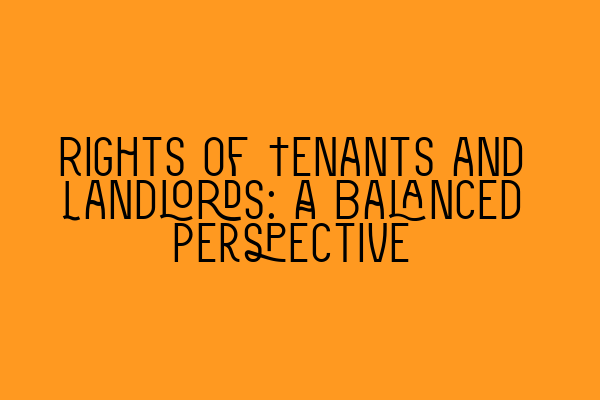Rights of Tenants and Landlords: A Balanced Perspective
In the realm of property law, the rights of tenants and landlords play a crucial role in maintaining a harmonious landlord-tenant relationship. It is essential to understand the rights and responsibilities of both parties to ensure a fair and mutually beneficial arrangement. In this blog post, we will explore the rights of tenants and landlords from a balanced perspective, shedding light on the legal framework that governs these relationships. Whether you are a tenant seeking a secure and comfortable living space or a landlord aiming to protect your property rights, this article will provide valuable insights.
First and foremost, let’s delve into the rights of tenants. As a tenant, you enjoy several legal protections that safeguard your rights and interests. Perhaps the most fundamental right is the right to occupy the leased property without interference from the landlord, as long as you fulfill your contractual obligations. This means that your landlord cannot enter your rented premises without giving proper notice, except in certain emergency situations. If your landlord violates this right, it is important to seek legal advice to address the issue.
Another significant tenant right is the right to a habitable living space. Landlords have a legal obligation to maintain the property in a safe and habitable condition, ensuring that it is free from hazards such as mold, pests, or structural issues. If your landlord fails to address these problems, you have the right to request repairs or take legal action to compel compliance. It is vital to document any issues in writing and notify your landlord promptly to protect your rights in case of dispute resolution.
Furthermore, tenants have the right to privacy. Your landlord cannot invade your privacy by entering your rented property without proper notice, except in specific circumstances outlined by law. This protection allows you to enjoy your living space and maintain a sense of security. If you feel that your privacy has been violated, consult with a legal professional to assess your options for recourse.
While tenants have important rights, it is crucial to understand that landlords also have their own set of rights and responsibilities. One such right is the right to collect rent. As a landlord, you have the legal right to receive timely payment for the use of your property. In case of non-payment, you have the option to pursue eviction proceedings or other available legal remedies. It is advisable to establish clear and transparent rent payment terms in the tenancy agreement to avoid any misunderstandings.
Additionally, landlords have the right to protect their property. This includes the right to inspect the property periodically, ensure compliance with tenancy rules, and conduct necessary repairs or maintenance. However, it is important to note that landlords must provide reasonable notice before entering the rented premises, respecting the privacy and rights of the tenants. By balancing the need to protect property rights and respecting tenant privacy, a harmonious relationship can be sustained.
To maintain a balanced perspective, both tenants and landlords must familiarize themselves with the prevailing legal framework that regulates their rights and responsibilities. Engaging professional legal services, such as those offered by SQE Property Law & Land Law, can provide valuable assistance in navigating complex property issues. Their expertise in property law can help ensure that your rights are protected and any disputes are resolved amicably.
In conclusion, understanding the rights and responsibilities of tenants and landlords is essential for maintaining a healthy landlord-tenant relationship. By recognizing and respecting each other’s rights, a balance can be achieved that allows for safe, comfortable, and mutually beneficial living arrangements. Whether you are a tenant or a landlord, it is advisable to seek legal advice when dealing with complex property matters. By working together and being aware of the legal framework, both parties can contribute to a fair and harmonious renting experience.
Related Articles:
– SQE 1 Practice Exam Questions
– SQE 1 Practice Mocks FLK1 FLK2
– SQE 2 Preparation Courses
– SQE 1 Preparation Courses
– SRA SQE Exam Dates
